Deck 26: The Urinary System
Question
Question
Question
Question
Question
Question
Question
Question
Question
Question
Question
Question
Question
Question
Question
Question
Question
Question
Question
Question
Question
Question
Question
Question
Question
Question
Question
Question
Question
Question
Question
Question
Question
Question
Question
Question
Question
Question
Question
Question
Question
Question
Question
Question
Question
Question
Question
Question
Question
Question
Question
Question
Question
Question
Question
Question
Question
Question
Question
Question
Question
Question
Question
Question
Question
Question
Question
Question
Question
Question
Question
Question
Question

Unlock Deck
Sign up to unlock the cards in this deck!
Unlock Deck
Unlock Deck
1/73
Play
Full screen (f)
Deck 26: The Urinary System
1
The portion of the kidney that extends between the renal pyramids is called the
A)renal columns
B)renal medulla
C)renal pelvis
D)calyces
E)renal papilla
A)renal columns
B)renal medulla
C)renal pelvis
D)calyces
E)renal papilla
A
2
Which is the correct order of blood flow through the kidneys?
A)renal artery > segmental artery > interlobular artery > peritubular capillaries > afferent arterioles
B)interlobar arteries > arcuate arteries > glomerular capillaries > arcuate veins
C)arcuate veins > arcuate arteries > glomerular capillaries > renal vein
D)renal vein > segmental arteries > interlobar arteries > efferent arterioles
E)interlobar veins > afferent arterioles > efferent arterioles > glomerular capillaries
A)renal artery > segmental artery > interlobular artery > peritubular capillaries > afferent arterioles
B)interlobar arteries > arcuate arteries > glomerular capillaries > arcuate veins
C)arcuate veins > arcuate arteries > glomerular capillaries > renal vein
D)renal vein > segmental arteries > interlobar arteries > efferent arterioles
E)interlobar veins > afferent arterioles > efferent arterioles > glomerular capillaries
B
3
The proximal convoluted tubules reabsorb which percentage of filtered water?
A)25%
B)50%
C)65%
D)80%
E)99%
A)25%
B)50%
C)65%
D)80%
E)99%
C
4
Which is the correct order of filtrate flow?
A)glomerular capsule,proximal convoluted tubule (PCT),nephron loop,distal convoluted tubule (DCT),collecting duct
B)nephron loop,glomerular capsule,PCT,DCT,collecting duct
C)ascending limb of loop,PCT,DCT,collecting duct
D)collecting duct,DCT,PCT,collecting duct,glomerular capsule
E)PCT,glomerular capsule,DCT,collecting duct,nephron loop
A)glomerular capsule,proximal convoluted tubule (PCT),nephron loop,distal convoluted tubule (DCT),collecting duct
B)nephron loop,glomerular capsule,PCT,DCT,collecting duct
C)ascending limb of loop,PCT,DCT,collecting duct
D)collecting duct,DCT,PCT,collecting duct,glomerular capsule
E)PCT,glomerular capsule,DCT,collecting duct,nephron loop

Unlock Deck
Unlock for access to all 73 flashcards in this deck.
Unlock Deck
k this deck
5
This is smooth dense irregular connective tissue that is continuous with the outer coat of the ureter.
A)adipose capsule
B)renal capsule
C)renal hilus
D)renal cortex
E)renal medulla
A)adipose capsule
B)renal capsule
C)renal hilus
D)renal cortex
E)renal medulla

Unlock Deck
Unlock for access to all 73 flashcards in this deck.
Unlock Deck
k this deck
6
Increased secretion of hydrogen ions would result in a(n)______________ of blood ____________?
A)increase,pressure
B)decrease,volume
C)increase,sodium levels
D)decrease,pH
E)increase,urea
A)increase,pressure
B)decrease,volume
C)increase,sodium levels
D)decrease,pH
E)increase,urea

Unlock Deck
Unlock for access to all 73 flashcards in this deck.
Unlock Deck
k this deck
7
This is a nephron process that results in a substance in blood entering the already formed filtrate.
A)reabsorption
B)filtration
C)secretion
D)excretion
E)none of these choices
A)reabsorption
B)filtration
C)secretion
D)excretion
E)none of these choices

Unlock Deck
Unlock for access to all 73 flashcards in this deck.
Unlock Deck
k this deck
8
This term means the return of substances into the blood stream from the filtrate.
A)reabsorption
B)filtration
C)secretion
D)excretion
E)none of these choices
A)reabsorption
B)filtration
C)secretion
D)excretion
E)none of these choices

Unlock Deck
Unlock for access to all 73 flashcards in this deck.
Unlock Deck
k this deck
9
Which of the following is a waste product normally excreted by the kidneys?
A)urea
B)glucose
C)insulin
D)cholesterol
E)carbon dioxide
A)urea
B)glucose
C)insulin
D)cholesterol
E)carbon dioxide

Unlock Deck
Unlock for access to all 73 flashcards in this deck.
Unlock Deck
k this deck
10
Which is not a major function of the kidney?
A)regulation of blood ionic composition
B)regulation of blood cell size
C)regulation of blood volume
D)regulation of blood pressure
E)regulation of blood pH
A)regulation of blood ionic composition
B)regulation of blood cell size
C)regulation of blood volume
D)regulation of blood pressure
E)regulation of blood pH

Unlock Deck
Unlock for access to all 73 flashcards in this deck.
Unlock Deck
k this deck
11
Increased secretion of aldosterone would result in a(n)______________ of blood ____________?
A)increase,potassium
B)decrease,volume
C)increase,calcium levels
D)decrease,pH
E)increase,sodium
A)increase,potassium
B)decrease,volume
C)increase,calcium levels
D)decrease,pH
E)increase,sodium

Unlock Deck
Unlock for access to all 73 flashcards in this deck.
Unlock Deck
k this deck
12
Which of the following is NOT a way angiotensin II affects the kidneys?
A)It increases GFR
B)It can decrease GFR
C)It enhances reabsorption of certain ions
D)It stimulates the release of aldosterone
E)None of these choices
A)It increases GFR
B)It can decrease GFR
C)It enhances reabsorption of certain ions
D)It stimulates the release of aldosterone
E)None of these choices

Unlock Deck
Unlock for access to all 73 flashcards in this deck.
Unlock Deck
k this deck
13
Urea recycling can cause a buildup of urea in the
A)renal capsule
B)nephron loop
C)ascending tubule
D)renal medulla
E)renal pelvis
A)renal capsule
B)nephron loop
C)ascending tubule
D)renal medulla
E)renal pelvis

Unlock Deck
Unlock for access to all 73 flashcards in this deck.
Unlock Deck
k this deck
14
This is the formation of a new glucose molecule.
A)glycolysis
B)gluconeogenesis
C)glucosamine
D)glucose
E)calcitriol
A)glycolysis
B)gluconeogenesis
C)glucosamine
D)glucose
E)calcitriol

Unlock Deck
Unlock for access to all 73 flashcards in this deck.
Unlock Deck
k this deck
15
This is the structure of the nephron that filters blood.
A)glomerular capsule
B)nephron loop
C)ascending limb
D)collecting duct
E)renal tubule
A)glomerular capsule
B)nephron loop
C)ascending limb
D)collecting duct
E)renal tubule

Unlock Deck
Unlock for access to all 73 flashcards in this deck.
Unlock Deck
k this deck
16
This layer of filtration membrane is composed of collagen fibers and proteoglycans in a glycoprotein matrix.
A)glomerular endothelial cells
B)basal lamina
C)pedicels
D)filtration slits
E)slit membrane
A)glomerular endothelial cells
B)basal lamina
C)pedicels
D)filtration slits
E)slit membrane

Unlock Deck
Unlock for access to all 73 flashcards in this deck.
Unlock Deck
k this deck
17
Which structure of the nephron reabsorbs the most substances?
A)glomerular capsule
B)nephron loop
C)ascending limb
D)collecting duct
E)proximal convoluted tubule
A)glomerular capsule
B)nephron loop
C)ascending limb
D)collecting duct
E)proximal convoluted tubule

Unlock Deck
Unlock for access to all 73 flashcards in this deck.
Unlock Deck
k this deck
18
This occurs when a substance passes from the fluid in the tubular lumen through the apical membrane,across the cytosol,and then into the interstitial fluid.
A)paracellular reabsoprtion
B)transcellular reabsoprtion
C)apical reasborption
D)basolateral reabsorption
E)active transport
A)paracellular reabsoprtion
B)transcellular reabsoprtion
C)apical reasborption
D)basolateral reabsorption
E)active transport

Unlock Deck
Unlock for access to all 73 flashcards in this deck.
Unlock Deck
k this deck
19
An analysis of the physical,chemical,and microscopic properties of urine is called
A)urinalysis
B)filtration study
C)concentration study
D)diuretic
E)osmolarity
A)urinalysis
B)filtration study
C)concentration study
D)diuretic
E)osmolarity

Unlock Deck
Unlock for access to all 73 flashcards in this deck.
Unlock Deck
k this deck
20
This occurs when stretching triggers contraction of smooth muscle walls in afferent arterioles.
A)glomerular filtration rate
B)tubulomerular feedback
C)myogenic mechanism
D)renal autoregulation
E)capsular hydrostatic pressure
A)glomerular filtration rate
B)tubulomerular feedback
C)myogenic mechanism
D)renal autoregulation
E)capsular hydrostatic pressure

Unlock Deck
Unlock for access to all 73 flashcards in this deck.
Unlock Deck
k this deck
21
Where is the papillary duct?
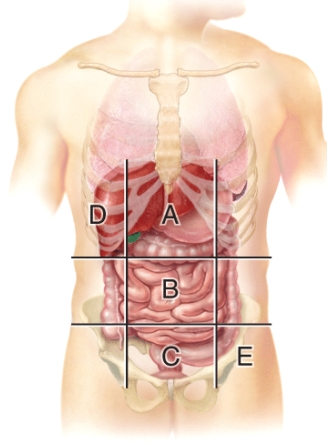
A)C
B)F
C)H
D)N
E)O

A)C
B)F
C)H
D)N
E)O

Unlock Deck
Unlock for access to all 73 flashcards in this deck.
Unlock Deck
k this deck
22
What is line "C" pointing to?
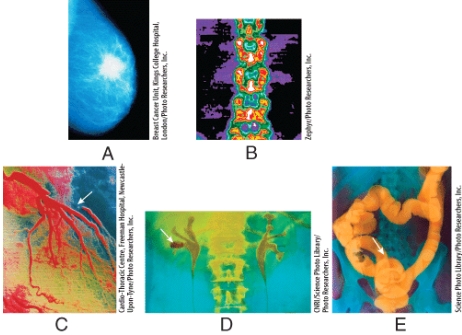
A)Distal convoluted tubule
B)Interlobular artery
C)Efferent arteriole
D)Arcuate artery
E)Corticomedullary junction

A)Distal convoluted tubule
B)Interlobular artery
C)Efferent arteriole
D)Arcuate artery
E)Corticomedullary junction

Unlock Deck
Unlock for access to all 73 flashcards in this deck.
Unlock Deck
k this deck
23
This transports urine from the kidney to the bladder.
A)Urethra
B)Ureter
C)Descending nephron loop
D)Renal hilus
E)None of these choices
A)Urethra
B)Ureter
C)Descending nephron loop
D)Renal hilus
E)None of these choices

Unlock Deck
Unlock for access to all 73 flashcards in this deck.
Unlock Deck
k this deck
24
What two structures comprise the renal corpuscle?
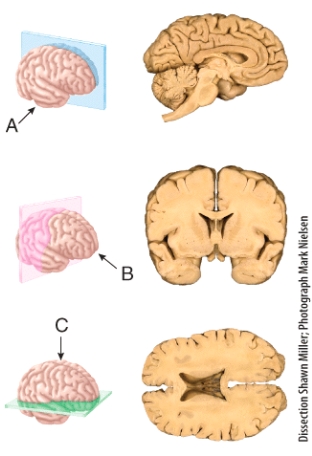
A)A and B
B)C and D
C)E and F
D)K and L
E)N and O

A)A and B
B)C and D
C)E and F
D)K and L
E)N and O

Unlock Deck
Unlock for access to all 73 flashcards in this deck.
Unlock Deck
k this deck
25
Each kidney can have anywhere from 8 to 18 of these.
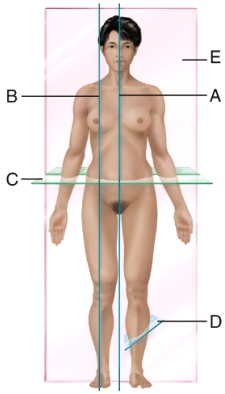
A)I
B)J
C)K
D)L
E)H

A)I
B)J
C)K
D)L
E)H

Unlock Deck
Unlock for access to all 73 flashcards in this deck.
Unlock Deck
k this deck
26
This is composed of dense irregular tissue that runs continuous with the ureter.
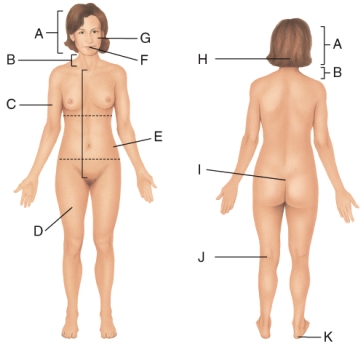
A)A
B)B
C)C

A)A
B)B
C)C

Unlock Deck
Unlock for access to all 73 flashcards in this deck.
Unlock Deck
k this deck
27
Where is the corticomedullary junction?
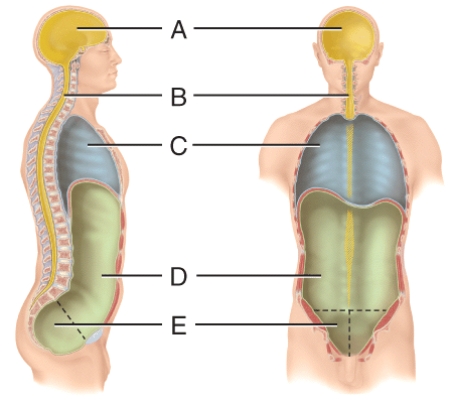
A)G
B)J
C)M
D)N
E)O

A)G
B)J
C)M
D)N
E)O

Unlock Deck
Unlock for access to all 73 flashcards in this deck.
Unlock Deck
k this deck
28
This is a test to measure kidney function.
A)Plasma creatinine
B)Renal study
C)Kidney assay
D)Dialysis
E)Hilus study
A)Plasma creatinine
B)Renal study
C)Kidney assay
D)Dialysis
E)Hilus study

Unlock Deck
Unlock for access to all 73 flashcards in this deck.
Unlock Deck
k this deck
29
This structure is the apex of a renal pyramid.
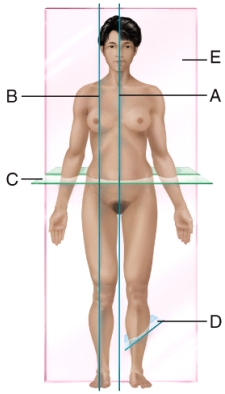
A)E
B)D
C)G
D)K
E)L

A)E
B)D
C)G
D)K
E)L

Unlock Deck
Unlock for access to all 73 flashcards in this deck.
Unlock Deck
k this deck
30
This lies in the anterior corner of the trigone of the bladder.
A)Urethral sphincter
B)Adventitia bundle
C)Ureter
D)Internal urethral orifice
E)Muscularis bundle
A)Urethral sphincter
B)Adventitia bundle
C)Ureter
D)Internal urethral orifice
E)Muscularis bundle

Unlock Deck
Unlock for access to all 73 flashcards in this deck.
Unlock Deck
k this deck
31
This layer's main function is to protect the kidney from trauma and hold it in place within the abdominal cavity.
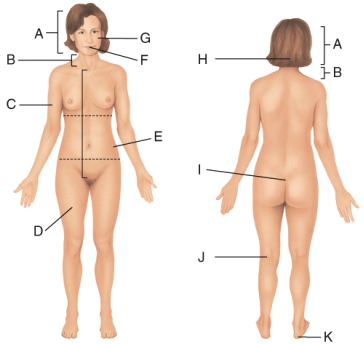
A)A
B)B
C)C

A)A
B)B
C)C

Unlock Deck
Unlock for access to all 73 flashcards in this deck.
Unlock Deck
k this deck
32
What does line "M" point to?
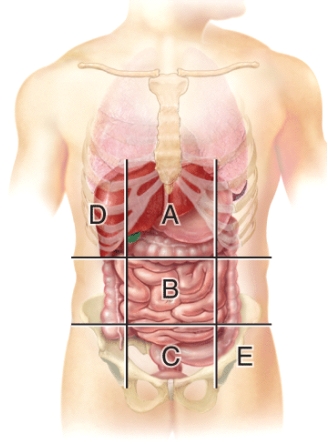
A)Arcuate artery
B)Arcuate vein
C)Collecting duct
D)Descending loop
E)Efferent arteriole

A)Arcuate artery
B)Arcuate vein
C)Collecting duct
D)Descending loop
E)Efferent arteriole

Unlock Deck
Unlock for access to all 73 flashcards in this deck.
Unlock Deck
k this deck
33
Urine formed by the nephrons first drains into these.
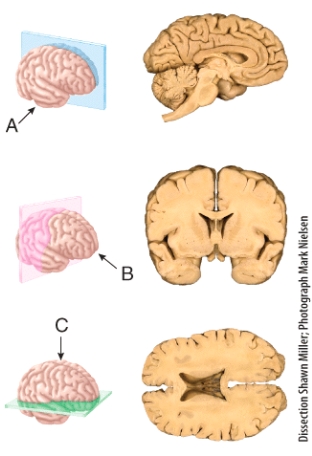
A)H
B)I
C)J
D)K
E)L

A)H
B)I
C)J
D)K
E)L

Unlock Deck
Unlock for access to all 73 flashcards in this deck.
Unlock Deck
k this deck
34
Where is the ascending limb of the nephron loop?
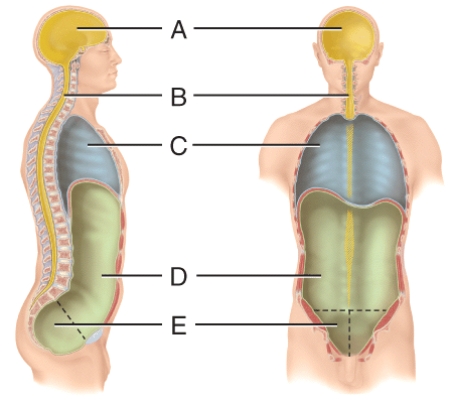
A)C
B)D
C)J
D)K
E)L

A)C
B)D
C)J
D)K
E)L

Unlock Deck
Unlock for access to all 73 flashcards in this deck.
Unlock Deck
k this deck
35
Where is the arcuate vein?
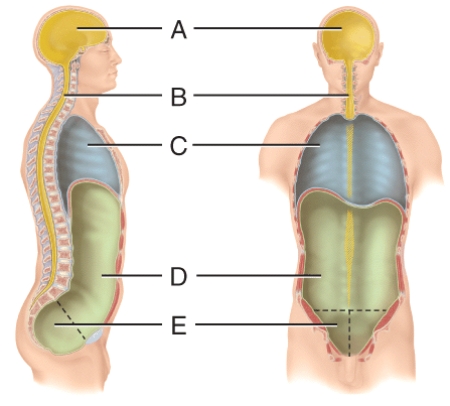
A)E
B)F
C)G
D)H
E)I

A)E
B)F
C)G
D)H
E)I

Unlock Deck
Unlock for access to all 73 flashcards in this deck.
Unlock Deck
k this deck
36
This layer runs deep to the peritoneum on the anterior surface of the kidneys.
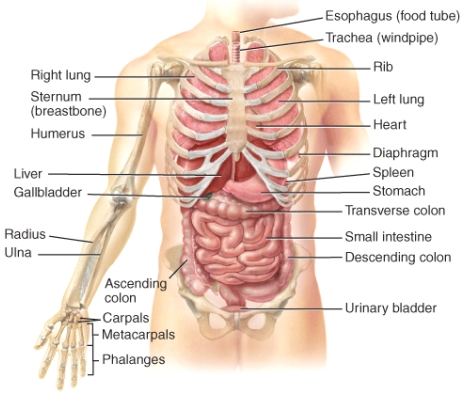
A)A
B)B
C)C

A)A
B)B
C)C

Unlock Deck
Unlock for access to all 73 flashcards in this deck.
Unlock Deck
k this deck
37
This layer of the ureter is composed of connective tissue,collagen and elastic fibers.
A)Mucosa
B)Transitional epithelium
C)Lamina propria
D)Adventitia
E)Lamina elastica
A)Mucosa
B)Transitional epithelium
C)Lamina propria
D)Adventitia
E)Lamina elastica

Unlock Deck
Unlock for access to all 73 flashcards in this deck.
Unlock Deck
k this deck
38
Water accounts for which percentage of the total volume of urine?
A)25%
B)50%
C)75%
D)80%
E)95%
A)25%
B)50%
C)75%
D)80%
E)95%

Unlock Deck
Unlock for access to all 73 flashcards in this deck.
Unlock Deck
k this deck
39
This can be divided into the cortical zone and the juxtamedullary zone.
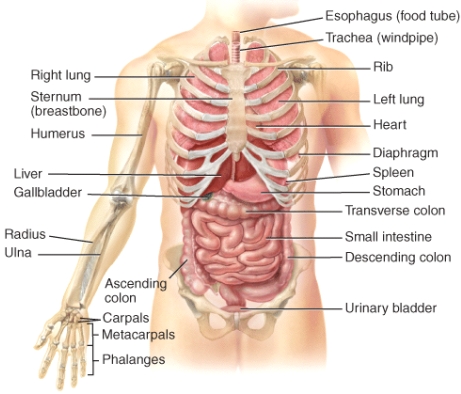
A)A
B)D
C)E
D)F
E)G

A)A
B)D
C)E
D)F
E)G

Unlock Deck
Unlock for access to all 73 flashcards in this deck.
Unlock Deck
k this deck
40
Where is the distal convoluted tubule?
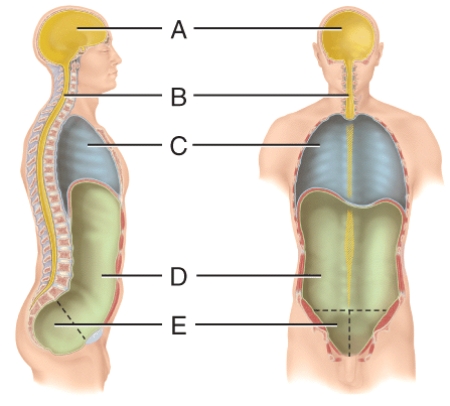
A)D
B)E
C)J
D)K
E)L

A)D
B)E
C)J
D)K
E)L

Unlock Deck
Unlock for access to all 73 flashcards in this deck.
Unlock Deck
k this deck
41
Fluid flowing from point N in the figure will go to which structure next?
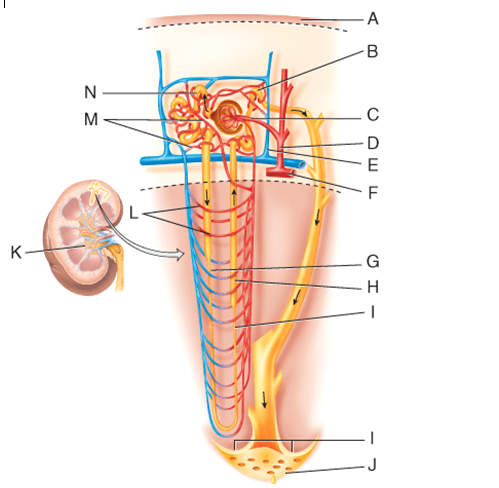
A)G
B)H
C)C
D)B
E)K

A)G
B)H
C)C
D)B
E)K

Unlock Deck
Unlock for access to all 73 flashcards in this deck.
Unlock Deck
k this deck
42
What is line "B" pointing to?
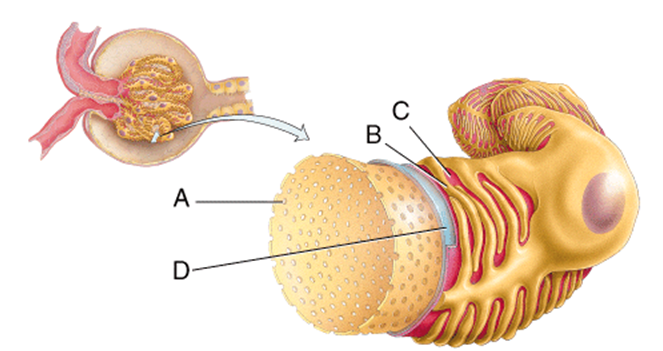
A)Fenestration
B)Pedicel
C)Filtration slit
D)Basal lamina
E)Lumen of the glomerulus

A)Fenestration
B)Pedicel
C)Filtration slit
D)Basal lamina
E)Lumen of the glomerulus

Unlock Deck
Unlock for access to all 73 flashcards in this deck.
Unlock Deck
k this deck
43
Which vessel(s)in the diagram are the vasa recta?
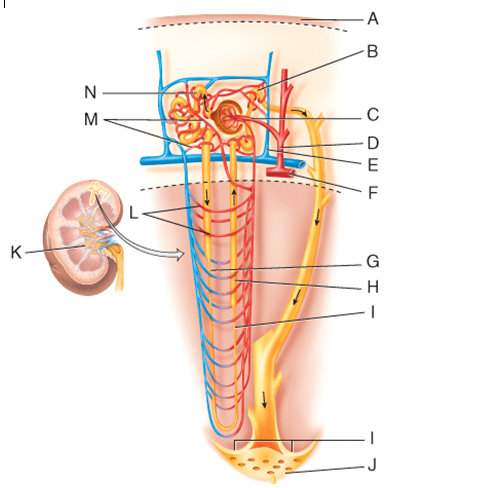
A)C
B)D
C)E
D)M
E)L

A)C
B)D
C)E
D)M
E)L

Unlock Deck
Unlock for access to all 73 flashcards in this deck.
Unlock Deck
k this deck
44
Fluid flowing from point B in the figure will go to which of the following structures?
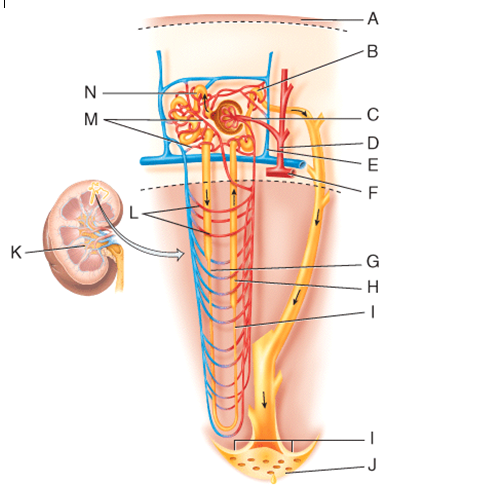
A)J
B)M
C)I
D)G
E)H

A)J
B)M
C)I
D)G
E)H

Unlock Deck
Unlock for access to all 73 flashcards in this deck.
Unlock Deck
k this deck
45
What is line "D" pointing to?

A)Fenestration
B)Pedicel
C)Filtration slit
D)Basal lamina
E)Lumen of the glomerulus

A)Fenestration
B)Pedicel
C)Filtration slit
D)Basal lamina
E)Lumen of the glomerulus

Unlock Deck
Unlock for access to all 73 flashcards in this deck.
Unlock Deck
k this deck
46
Describe the flow of blood through the kidneys.

Unlock Deck
Unlock for access to all 73 flashcards in this deck.
Unlock Deck
k this deck
47
What is line "A" pointing to?
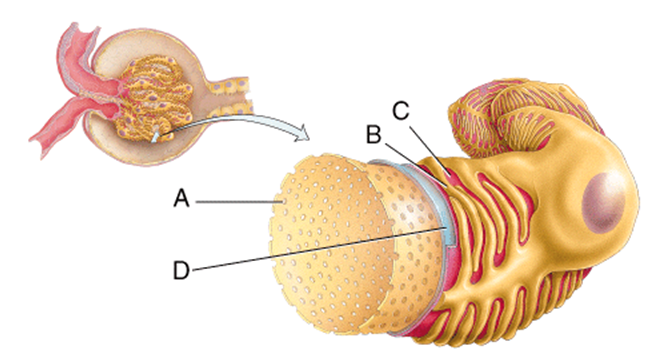
A)Fenestration
B)Pedicel
C)Filtration slit
D)Basal lamina
E)Lumen of the glomerulus

A)Fenestration
B)Pedicel
C)Filtration slit
D)Basal lamina
E)Lumen of the glomerulus

Unlock Deck
Unlock for access to all 73 flashcards in this deck.
Unlock Deck
k this deck
48
Fluid flowing from point H in the figure will go to which structure next?
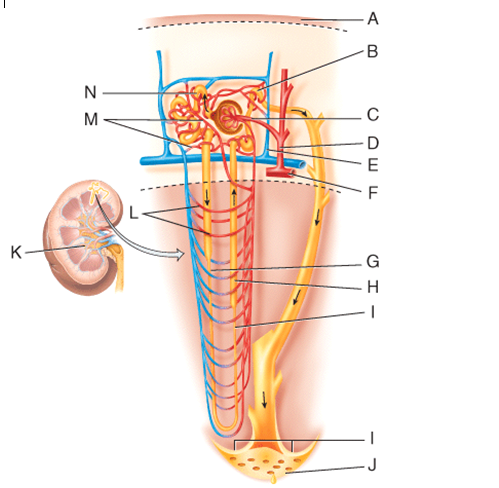
A)L
B)B
C)I
D)G
E)N

A)L
B)B
C)I
D)G
E)N

Unlock Deck
Unlock for access to all 73 flashcards in this deck.
Unlock Deck
k this deck
49
Trace the flow of a water molecule through the nephrons from the afferent arteriole to the minor calyx.

Unlock Deck
Unlock for access to all 73 flashcards in this deck.
Unlock Deck
k this deck
50
Fluid flowing from point G in the figure will go to which structure next?
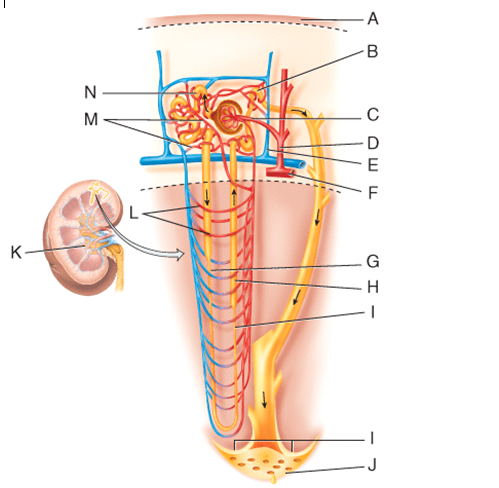
A)N
B)H
C)I
D)M
E)K

A)N
B)H
C)I
D)M
E)K

Unlock Deck
Unlock for access to all 73 flashcards in this deck.
Unlock Deck
k this deck
51
Which vessel in the diagram is the arcuate artery?
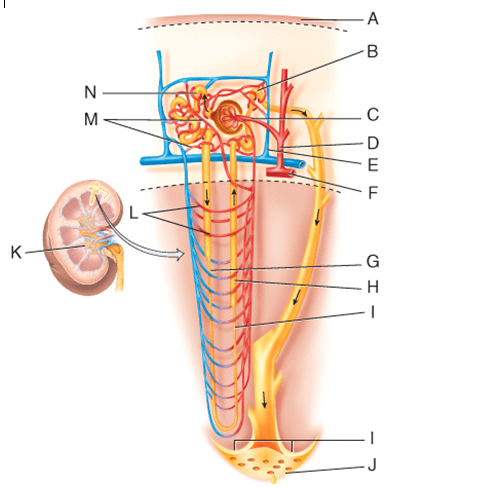
A)C
B)D
C)E
D)F
E)L

A)C
B)D
C)E
D)F
E)L

Unlock Deck
Unlock for access to all 73 flashcards in this deck.
Unlock Deck
k this deck
52
Describe the structural features of the renal corpuscle that enhance its blood filtering capacity.

Unlock Deck
Unlock for access to all 73 flashcards in this deck.
Unlock Deck
k this deck
53
What is line "C" pointing to?
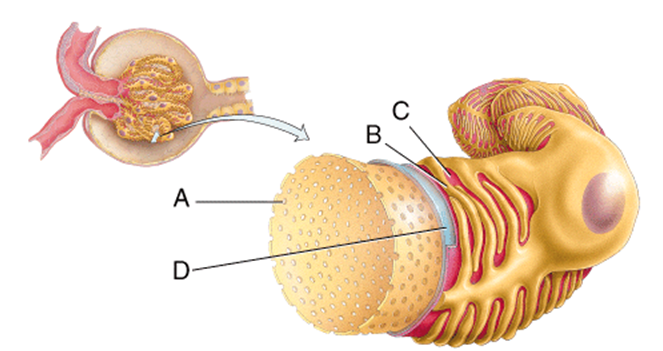
A)Fenestration
B)Pedicel
C)Filtration slit
D)Basal lamina
E)Lumen of the glomerulus

A)Fenestration
B)Pedicel
C)Filtration slit
D)Basal lamina
E)Lumen of the glomerulus

Unlock Deck
Unlock for access to all 73 flashcards in this deck.
Unlock Deck
k this deck
54
Which vessel(s)in the diagram are the peritubular capillaries?
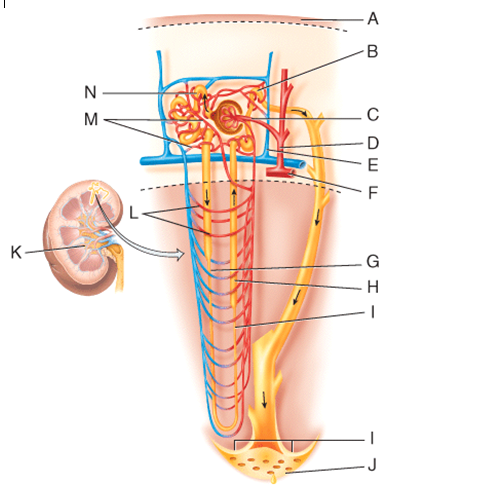
A)C
B)D
C)E
D)M
E)L

A)C
B)D
C)E
D)M
E)L

Unlock Deck
Unlock for access to all 73 flashcards in this deck.
Unlock Deck
k this deck
55
An increase in permeability of the filtration membrane due to disease,injury,or irritation of kidney cells by substances such as bacterial toxins,ether,or heavy metals indicates which condition?
A)albuminuria
B)lucosuria
C)robilinogenuria
D)ketonuria
E)bilirubinuria
A)albuminuria
B)lucosuria
C)robilinogenuria
D)ketonuria
E)bilirubinuria

Unlock Deck
Unlock for access to all 73 flashcards in this deck.
Unlock Deck
k this deck
56
Which vessel in the diagram is the afferent arteriole?
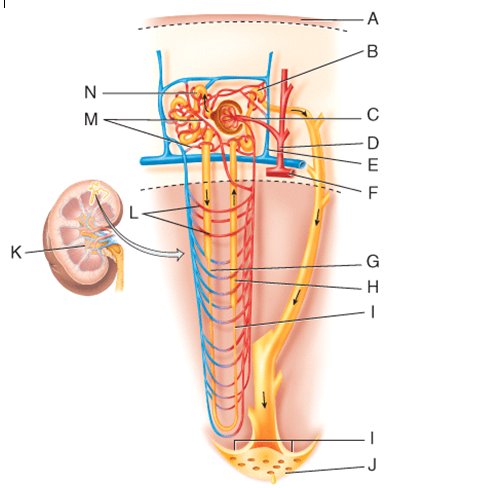
A)C
B)D
C)E
D)F
E)L

A)C
B)D
C)E
D)F
E)L

Unlock Deck
Unlock for access to all 73 flashcards in this deck.
Unlock Deck
k this deck
57
Which vessel in the diagram is the interlobular vein?
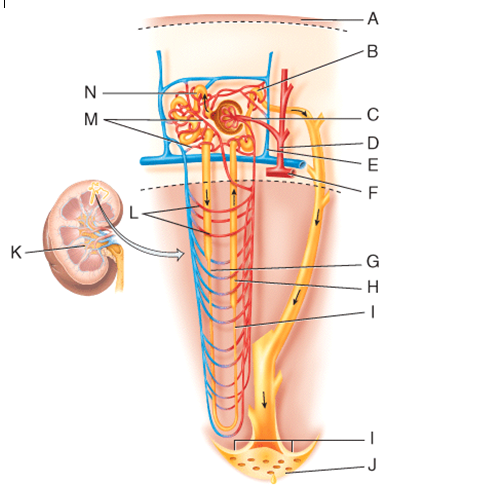
A)C
B)D
C)E
D)F
E)L

A)C
B)D
C)E
D)F
E)L

Unlock Deck
Unlock for access to all 73 flashcards in this deck.
Unlock Deck
k this deck
58
Describe in detail how the renin angiotensin negative feedback loop helps regulate blood pressure and glomerular filtration rate in response to dehydration.

Unlock Deck
Unlock for access to all 73 flashcards in this deck.
Unlock Deck
k this deck
59
Discuss the importance of countercurrent flow to the functioning of the nephron.

Unlock Deck
Unlock for access to all 73 flashcards in this deck.
Unlock Deck
k this deck
60
Which vessel in the diagram is the interlobular artery?
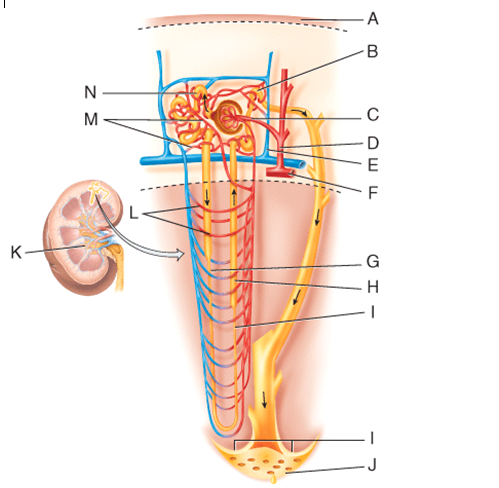
A)D
B)E
C)F
D)L

A)D
B)E
C)F
D)L

Unlock Deck
Unlock for access to all 73 flashcards in this deck.
Unlock Deck
k this deck
61
Excessive urine concentration of a normal breakdown product of hemoglobin,caused by pernicious anemia,infectious hepatitis,jaundice or cirrhosis,indicates which condition?
A)albuminuria
B)glucosuria
C)urobilinogenuria
D)hematuria
E)bilirubinuria
A)albuminuria
B)glucosuria
C)urobilinogenuria
D)hematuria
E)bilirubinuria

Unlock Deck
Unlock for access to all 73 flashcards in this deck.
Unlock Deck
k this deck
62
This substance gives bile its major pigmentation:
A)ketone bodies
B)erythrocytes
C)casts
D)bilirubin
E)glucose
A)ketone bodies
B)erythrocytes
C)casts
D)bilirubin
E)glucose

Unlock Deck
Unlock for access to all 73 flashcards in this deck.
Unlock Deck
k this deck
63
Anorexia,starvation,or a diet too low in carbohydrates indicates which condition?
A)albuminuria
B)glucosuria
C)urobilinogenuria
D)ketonuria
E)bilirubinuria
A)albuminuria
B)glucosuria
C)urobilinogenuria
D)ketonuria
E)bilirubinuria

Unlock Deck
Unlock for access to all 73 flashcards in this deck.
Unlock Deck
k this deck
64
These are tiny masses of material,hardened in the lumen of the urinary tubule and are flushed out when filtrate builds up behind them:
A)ketone bodies
B)erythrocytes
C)casts
D)microbes
E)urobilinogen
A)ketone bodies
B)erythrocytes
C)casts
D)microbes
E)urobilinogen

Unlock Deck
Unlock for access to all 73 flashcards in this deck.
Unlock Deck
k this deck
65
Which is the normal pH range of urine in humans?
A)8)1 - 10.6
B)4)6 - 8.0
C)1)0 - 3.0
D)3)1 - 4.0
E)10.0 - 12.0
A)8)1 - 10.6
B)4)6 - 8.0
C)1)0 - 3.0
D)3)1 - 4.0
E)10.0 - 12.0

Unlock Deck
Unlock for access to all 73 flashcards in this deck.
Unlock Deck
k this deck
66
Parasympathetic division of ANS regulates kidney functions.

Unlock Deck
Unlock for access to all 73 flashcards in this deck.
Unlock Deck
k this deck
67
This hormone is released when the blood volume increases.
A)Parathyroid Hormone
B)Renin
C)ADH
D)Atrial Natriuretic Peptide
E)Aldosterone
A)Parathyroid Hormone
B)Renin
C)ADH
D)Atrial Natriuretic Peptide
E)Aldosterone

Unlock Deck
Unlock for access to all 73 flashcards in this deck.
Unlock Deck
k this deck
68
Consumption of salty food will cause an increase in this hormone.
A)Aldosterone
B)Renin
C)ANH
D)Angiotensin-II
E)ADH
A)Aldosterone
B)Renin
C)ANH
D)Angiotensin-II
E)ADH

Unlock Deck
Unlock for access to all 73 flashcards in this deck.
Unlock Deck
k this deck
69
What is the normal specific gravity range of urine in humans?
A)2)350 - 3.700
B)0)002 - 1.000
C)4)6 - 8.0
D)1)001 - 1.035
E)1)04 - 2.60
A)2)350 - 3.700
B)0)002 - 1.000
C)4)6 - 8.0
D)1)001 - 1.035
E)1)04 - 2.60

Unlock Deck
Unlock for access to all 73 flashcards in this deck.
Unlock Deck
k this deck
70
Candida albicans and E.coli are which type of abnormal constituent of urine:
A)ketone bodies
B)erythrocytes
C)casts
D)microbes
E)urobilinogen
A)ketone bodies
B)erythrocytes
C)casts
D)microbes
E)urobilinogen

Unlock Deck
Unlock for access to all 73 flashcards in this deck.
Unlock Deck
k this deck
71
Stress,causing excessive amounts of epinephrine secretion which stimulates glycogen breakdown,indicates which condition? This condition can also indicate diabetes mellitus.
A)albuminuria
B)glucosuria
C)urobilinogenuria
D)hematuria
E)bilirubinuria
A)albuminuria
B)glucosuria
C)urobilinogenuria
D)hematuria
E)bilirubinuria

Unlock Deck
Unlock for access to all 73 flashcards in this deck.
Unlock Deck
k this deck
72
Absence of angiotensin converting enzyme will lead to
A)decreased blood pressure
B)increased blood pressure
C)will not have any effect on blood pressure
D)All of these choices are correct.
E)None of these choices is correct.
A)decreased blood pressure
B)increased blood pressure
C)will not have any effect on blood pressure
D)All of these choices are correct.
E)None of these choices is correct.

Unlock Deck
Unlock for access to all 73 flashcards in this deck.
Unlock Deck
k this deck
73
What is the normal volume of urine produced in humans?
A)1L / hr
B)2L / day
C)2L / hr
D)3L / week
E)10L / 24 hours
A)1L / hr
B)2L / day
C)2L / hr
D)3L / week
E)10L / 24 hours

Unlock Deck
Unlock for access to all 73 flashcards in this deck.
Unlock Deck
k this deck


